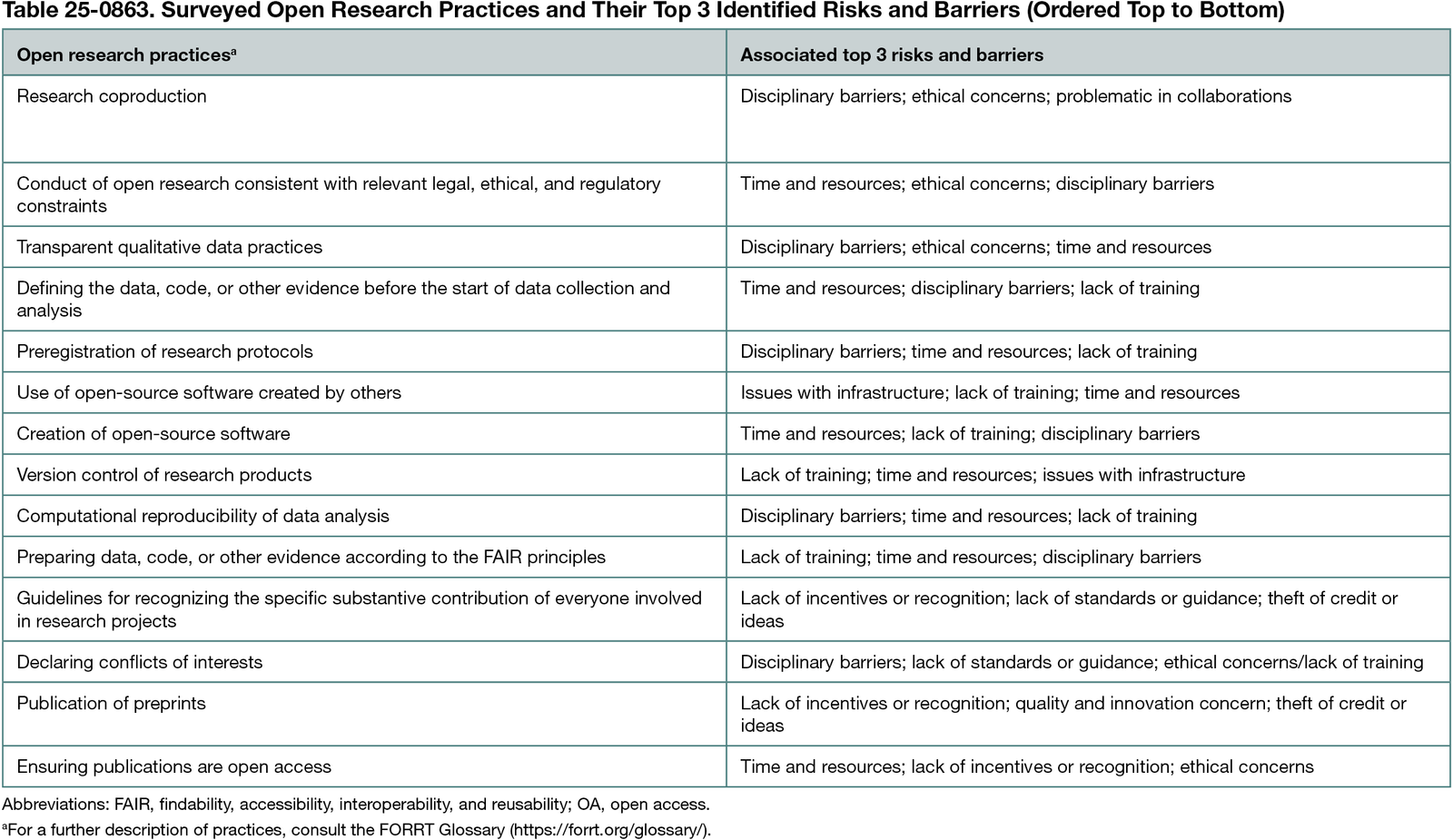Perceived Risks and Barriers to Open Research Practices in UK Higher Education
Abstract
Lukas Hughes-Noehrer,1 Noémie Aubert Bonn1
Objective
Open and transparent research practices are essential for high-quality research. Despite growing efforts to promote these practices through new funding policies, a rethinking of evaluation criteria, and investment in support and infrastructure, widespread adoption across disciplines remains challenging. Comprehensive data and analysis of the perceived risks and barriers to implementing open research practices within UK higher education institutions (HEIs) is still lacking.
Design
In 2025, we conducted an inductive thematic analysis of openly available data from the UK Reproducibility Network Open and Transparent Research Practices Survey,1 which was conducted between December 2022 and April 2023. The survey addressed 14 topics related to open research practices (eg, research coproduction, open-source code and software, reproducibility, open access, FAIR principles [findability, accessibility, interoperability, and reusability], and conflicts of interests), with respondents answering questions on practice, support, and approaches to each practice. This analysis focuses on responses to the open-text questions specifically referring to risks or barriers to researchers or to their fields of study across all 14 topics. Following SRQR guidelines,2 we ensured transparency in our analytic process. One researcher analyzed the data and developed initial codes, which have been reviewed by a second coder, before agreeing on collaboratively refined themes through iterative discussion. We used NVivo, version 14 (Lumivero) for analysis and data management. Reflexivity was maintained through regular team debriefs. Ethical approval was not required as the data were publicly available and anonymized.
Results
The survey received 2567 responses from research-active staff at 15 UK HEIs. Of these, 511 (20%) responses were complete. Participants reported barriers and risks to the 14 open research topics (Table 25-0863), which we grouped into 3 overarching categories: personal, systemic and institutional, and ethical and quality. In the personal category, respondents highlighted lacking motivation to undertake open research practices, with some perceiving that such practices should not rely on researchers and others perceiving such practices as a mere tick-box exercise. Respondents also feared that open research practices would expose errors and make them vulnerable to criticism. In the systemic and institutional category, respondents described barriers that made them unable to practice open research, such as methodological or disciplinary barriers. They also highlighted missing infrastructure and a lack of resources. Others also mentioned that institutions did not support them adequately, did not provide appropriate training, and did not recognize or incentivize open research practices, making it difficult for them to engage in open research. On an ethical and quality level, respondents worried that open research practices introduced new ethical concerns, or even that they detract from high-quality research and innovation.

Conclusions
These findings underscore critical challenges hindering the adoption of open research practices in UK HEIs. Addressing these barriers requires enhanced institutional support, targeted training, and robust incentives to empower researchers. Mitigating these challenges could significantly improve the quality and transparency of academic research.
References
1. Hughes-Noehrer L, Aubert Bonn N, De Maria M, et al. UK Reproducibility Network open and transparent research practices survey dataset. Sci Data. 2024;11:912. doi:10.1038/s41597-024-03786-z
2. O’Brien BC, Harris IB, Beckman TJ, Reed DA, Cook DA. Standards for reporting qualitative research: a synthesis of recommendations. Acad Med. 2014;89(9):1245-1251. doi:10.1097/ACM.0000000000000388
1Department of Computer Science, The University of Manchester, Manchester, UK, lukas.noehrer@manchester.ac.uk.
Conflict of Interest Disclosures
None reported.
Funding/Support
This work was partially funded by the Research England Development Fund. Research England had no further involvement in the research life cycle.
Acknowledgment
We want to thank all members of the United Kingdom Reproducibility Network who have contributed to the Open and Transparent Research Practices survey.
